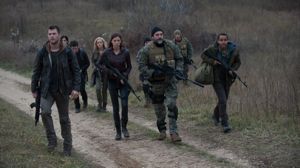Here's a cute piece of professional trivia for you: do you know where the distress signal "Mayday mayday mayday!" comes from? It's derived from the French term "venez m'aidez", which means "come help me". Someone obviously thought, hey if it worked for someone else, why create something original? It doesn't even have to make sense anymore. In fact, it's cooler if it doesn't. Hmm. I wonder if there's a parallel I can draw between this and the remake of Red Dawn…
Forget it, that might require me to use my brain.
Instead, let's just talk just about what makes this movie implausible and awesome: the premise. Without any warning, foreign soldiers parachute into a small American town and unleash hell. A group of average teenagers escape into the hills and use guerilla tactics to fight off the invading army. U.S. solider Jed Eckert (Chris Hemsworth) establishes his fighting credentials early and awkwardly, lest we forget later on. He then leads the rag-tag band of rebels called Wolverines through a series of coordinated assaults, no doubt inspired by his recent combat experience in Iraq.
For someone who lives in Canada, I find this all utter fantasy and rather invigorating. I'm not interested or qualified to criticize the film's unrealistic portrayals of violence or warfare. So I'm the target market. There were certainly moments in Red Dawn that hit the spot--namely, seeing all those parachutes fall from the sky, along with a few early attack sequences.
I am, however, fairly well-versed in cinema. This is why my brain started putting out its own distress calls.
Unconvincing performances! Lazy plot machinations! Incomprehensibly shot hand-to-hand combat sequences (and somehow a career stunt coordinator, Dan Bradley, directed this)! There's also a strange failure to commit the film to a tone - is it supposed to be horrifying or glorifying? Is the reluctance to vilify the villains an attempt at being even-handed, or simply the fearful result of real-world retaliation? That might have been the case with China (see the not-so-subtle 2008 Olympic opening ceremonies), but extensive post-production efforts to change the enemy to North Korea rendered that threat more absurd. Which is also a big detriment to the film.
The original Red Dawn (1984) tried to stir up American fears about the Soviets that had all-but disappeared by that point. Still, I'll never forget the opening scene, with students dangling from a broken window after being mowed-down by machine-gun fire. The way the characters dealt with a fellow Wolverine who was bugged with a tracking device also left a sick feeling in my gut. That film is far from a masterpiece, but it helped me understand something about a guerilla war - it's messy, grotesque, and makes people to unforgivable things. The new Red Dawn avoids ever going down that dark road.
Instead, the film goes for big bangs and introduces a late McGuffin mission to undo the enemy's advantage. Then the set pieces start to feel perfunctory and predictable, even if things aren't tied up with a neat bow at the end (that just feels like sequel bait). The big idea behind the film seems to capitalize on an exciting premise by just piling on more action. So if you thought Rambo: First Blood II was an improvement over First Blood, then you'll love the new Red Dawn. And if you're a sucker for action like me, you might also find your emotions involuntarily drafted into certain moments.
After all, it's hard not to feel answer the call to battle.
Over and out,
Christopher







